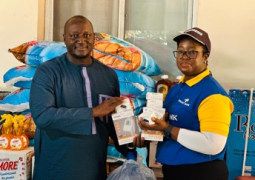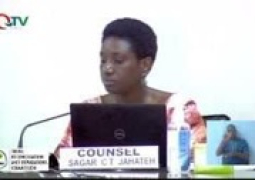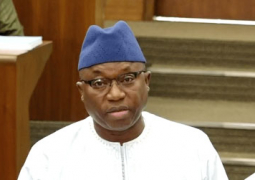However, the FAO the country representative, Moshibudi Rampedi said “we need to take specific measures to make it easier for women and girls to have equal tenure rights and have access to lands, fisheries and forest.”
The FAO representative was speaking recently during a Women Land Rights Policy Forum.
The convergence, held at the Sir Dawda Kairaba Jawara International Conference Center in Bijilo, was organised by The Resilience of Organisations for Transformative Smallholder Agriculture Programme (Roots) project which seeks to increase agricultural productivity and access to markets for enhanced food security, nutrition, and resilience for family farms and farmer organisations.
She recalled that FAO as an international organisation in 2010 developed and launched a gender and women’s rights database, saying: “I hope that the database would be part of what you will consider today during your discussion because it allows member states to certain reality issues that would make us realise the development of women's rights.”
“We are also supporting member states to identify what are major political, legal and cultural factors that influence gender equality when it comes to land tenure. We support member states to address issues related to gender disparity in making sure that they collect and analyse statistics that are related to ownership of lands and in this case, we always encourage member states where possible to adopt and follow international standards.”
For gender equality, she added, what is important is that, “we should ensure that the equal rights of women and men in the enjoyments of all human rights, while we acknowledge the differences between women and men. We need to take specific measures to make it easier for women and girls to have equal tenure rights and have access to lands, fisheries and forest,” she posited, adding: “We can never overlook the importance of making it possible for women to access lands because without ownership, it simply means we are putting limitation for the ability of women to contribute to the economy of the country.”
Mamour Alieu Jagne, Roots project coordinator, said “We want to discuss and reflect on the current situations of land tenure systems in the country on how women in particular, but also youths and other social groups are participating in this system, how they understand the existing barriers and opportunities, but more importantly on how to enhance their participation.”
“We will also look at lessons learned from the NEMA project in terms of its achievement among others. At the end of the day, we are hoping to identify the types of support that are needed to improve recognition of women’s rights to lands and enhance attention to improving lands governance among the relevant communities, practitioners and government agencies at different levels.”
Isatou Dea Sawaneh, chairperson of the National Women’s Council, affirmed that women ownership of lands is key towards the country achieving its development objectives, further claiming: “The issues of women ownership to lands have been going on for decades. It’s a problem, but I am quite optimistic that it could be addressed even if it’s not immediate. However, it’s good that we kick start so that we can recognise women’s rights to lands.”
“We should therefore look at ways on how to address this phenomenon in our quest to achieve the development of women in the country by making sure that women have access to their lands and also making sure that women do not waste their time on lands that would never be theirs.”
Bintou Gassama-Jammeh, deputy permanent secretary at the Ministry of Agriculture, said land rights is a global issue, adding that women’s access and ownership to lands globally is very limited compared to men.
In The Gambia, she said less than 20% of women have all rights and ownership to lands, claiming that 75% of the agricultural labour force as women. “If women form the large number of the agricultural labour force and they have a small percentage when it comes to ownership of lands, then it’s a big question and it’s something that we need to work on and find a solution.”
The government, communities and others, she added, need to understand that women should also have access to lands with a view to enabling them to contribute to food and nutrition in the country as most of the foods that we eat in the country are cultivated by women.





